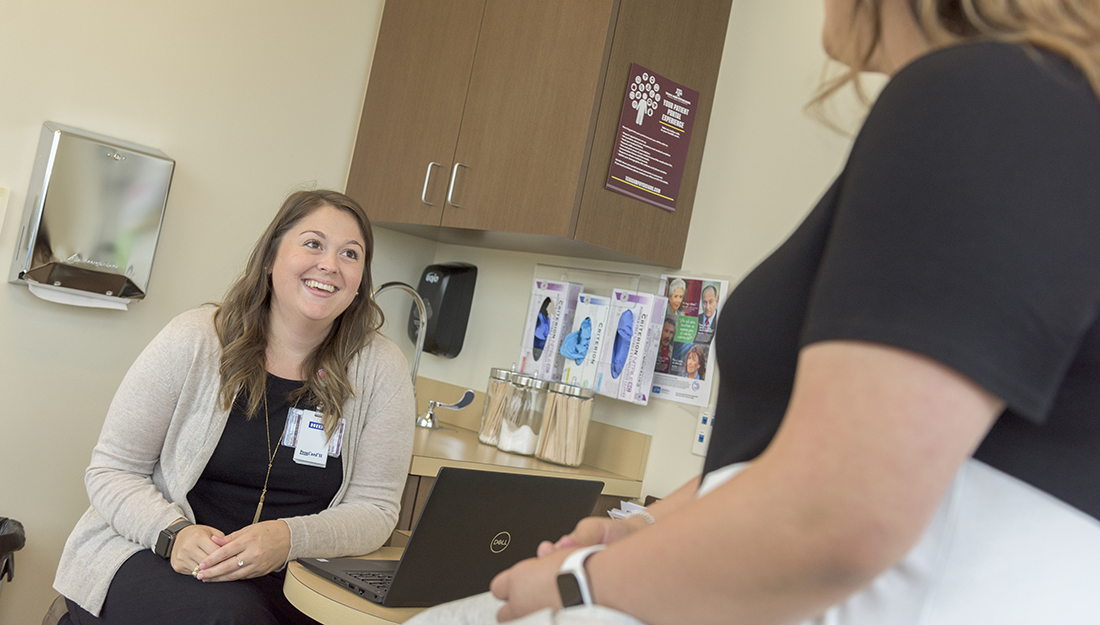- Lindsey Hendrix
- Dentistry, Featured, Medicine, Nursing, Public Health, Show on VR homepage
Advancing cancer care and research
Funding from the Cancer Prevention and Research Institute of Texas supports multiple Health Science Center cancer programs

Communities in Texas are getting healthier thanks to funding provided for cancer care and research by the Cancer Prevention and Research Institute of Texas (CPRIT). Texas A&M University Health Science Center is using funds awarded by CPRIT to directly impact individuals’ lives by providing free cancer screenings and support for the local community, as well as conducting groundbreaking research that gives hope for future generations.
Cancer Screening, Training, Education and Prevention
Low-income, underserved and rural Texans in 21 counties have access to colorectal cancer screenings, prevention education and patient navigation, thanks to support from CPRIT. Principal investigator Jason McKnight, MD, at Texas A&M College of Medicine and co-principal investigator Jane Bolin, BSN, JD, PhD, at Texas A&M College of Nursing and Texas A&M School of Public Health, received a three-year, $1.5 million grant in 2018 to advance colon cancer screenings provided through the Texas Cancer Screening, Training, Education and Prevention Program (C-STEP).
C-STEP received initial funding in 2011 to provide colorectal cancer screenings in the Brazos Valley while training family practice resident physicians in colonoscopy. With additional funding in 2014, the program expanded from seven to 17 counties, and the most recent award has allowed it to reach 21 counties, most of which are rural. To date, the program has provided 2,475 screenings and detected 23 colorectal cancers in those people who would not have access to these services otherwise. In addition, 17,254 people have received face-to-face education or navigation, more than 215,000 people have been indirectly reached, and 2,553 professionals have received face-to-face education on colorectal cancer prevention.
Low-income women who live in rural and medically underserved areas of Texas suffer from significantly higher incidence and mortality rates associated with breast and cervical cancer. A three-year, $1.35 million CPRIT grant awarded to the Health Science Center in 2017 has allowed C-STEP to expand women’s cancer prevention services to uninsured and low-income women residing in 17 largely rural Texas counties. The project is a collaboration between the Texas A&M Family Medicine Residency, College of Nursing and School of Public Health and provides breast and cervical cancer screenings, diagnostics, education, care and navigation while educating family physician residents, nursing and nurse practitioner students, and community health workers.
To date, C-STEP has provided 2,421 women’s breast cancer services that have detected 19 breast cancers, and 1,082 cervical cancer services that have resulted in three diagnoses. The project has been so successful it is serving as a national model and has spawned additional clinical partnerships that will make these services available for more women.
“In Texas, low-income and uninsured women age 45 to 64 have no access to women’s health services, which is very concerning because this is the age when cancer occurs,” said Cindy Weston, DNP, RN, CCRN, CNS-CC, FNP-BC, assistant professor and associate dean for clinical and outreach affairs at the College of Nursing. “The women’s health services grant has opened access to care for vulnerable women to have appropriate screenings and early detection of cancer, which improves their health outcomes.”
Tobacco Cessation
Tobacco use contributes to 19 percent of all cancers, which makes it the leading cause of preventable cancer and responsible for three in 10 cancer deaths, according to the Texas Department of State Health Services. CPRIT funding allows dental patients in Dallas County to receive free resources to help them quit tobacco and lower their risk for associated cancers. A three-year, $1.5 million CPRIT grant awarded to co-principal investigators Daniel Jones, DDS, PhD, and Crystal Stinson, DDS, PhD, MS, will enable the Texas A&M College of Dentistry to expand its current program to provide free onsite tobacco cessation counseling and nicotine replacement therapy at Agape Clinic, North Dallas Shared Ministries and the Nelson Tebedo Clinic.
Before the grant became available this spring, clinic dental patients who expressed an interest in quitting had to make a separate appointment at the dental college to see the one-and-only certified tobacco cessation counselor. With increased resources, the number of clients who can begin tobacco cessation treatment will essentially triple. Once all program components are in place, a blueprint will be shared with dental hygiene programs in surrounding counties to expand these services to underserved areas, including Denton and Potter County.
“We are excited for the opportunity to build on the College of Dentistry’s legacy of tobacco cessation services and to enhance the availability of these life-saving resources,” said Katharine Miller Nimmons, tobacco cessation program coordinator and evaluator for the CPRIT grant. “We look forward to partnering with community clinics in Dallas County and beyond to scale up this program.”
Advanced Cancer Research
Faculty at the Texas A&M Health Science Center are conducting groundbreaking, innovative cancer research. More than $25 million in CPRIT grants are allowing researchers to improve what we know about cancer and how we detect, prevent and treat it, bringing us closer to an ultimate cure and a healthier future for all.
Media contact: media@tamu.edu


